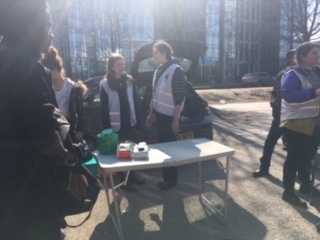The reality of Calais 'Jungle'
- A. Sophie

- Apr 17, 2019
- 3 min read
Though the jungle itself no longer exists the people who had inhibited it are still very much present. The destruction of the jungle merely left these people without even the lowest standard of a 'home'. I was told to expect many things in Calais from an array of people. Most of the advice focused around the refugees. With remarks like "they'll do anything to get to the UK" or "they are criminals". Those statements couldn't have been further from what I experienced.
I was met with smiles, tears of gratitude and genuine kindness from these beautiful people.
Though the people are some of the most honest and pleasant people I have met. What has become their standard of life is not. The situation is dire. There’s no other way to put it. These are innocent people escaping their homes where they have become victims of persecution and forever living in fear.
People who question and dispute why these people are here and why they want to come to the UK should go and experience what it is that is happening there. Meet the beautifully kind and gentle individuals and hear their stories. Some of which, with their permission we plan to share with you all.
Many pass judgement without understanding how the process works. Refugees go through a long-drawn process of being assessed by the French authorities, the decision is then made if they are to stay in France, be moved to another country or returned home.
Many are moved to another country. However, it doesn’t end there. They are then, again, assessed by the country they are situated in. Where at the end of the process, they are largely considered not suitable for the country and moved back to France. Where the process starts all over again.
Often the grounds of not being able to stay are that the refugee does not speak the native language. It does not come down to them lacking being able to offer something to their new community. We met, mathematics lecturers, taxi drivers, shop owners, accountants, business men who worked in association with British organisations, the list is endless.
The refugees just want to feel safe and no longer be passed from country to country with little care or consideration being shown of their basic human rights.
Returning to the point, why the UK? Many of these individuals were told they were not suitable for countries as they did not speak the language. Often the refugees spoke near perfect English. When asked if they wanted to go to the UK, the refugees simply replied that they did not explicitly want to be in the UK, but that they spoke English. All they want is to feel safe and be accepted in a country. Its important to remember only 5% of refugees currently have asylum in the UK and represent 0.25% of the UK's population.
We had the privilege of being able to hear these stories. Some did not want to share their story as they felt it was all they had. Those that did want to share, shared stories of losing entire families to ISIS, being beaten and racially abused by police and authorities across Europe and wishing they could at some point return to their home and be able to continue to live a life they loved.
Their stories will stay with us all throughout our lives and made us all grateful of the lives we lead.
When thinking of these people try to remember how lucky YOU are. Being able to go to university or work, able to freely speak our minds and most importantly, able to return to a home where our families are safe.
“Do not wait for leaders; do it alone, person to person.” Mother Teresa.









Comments